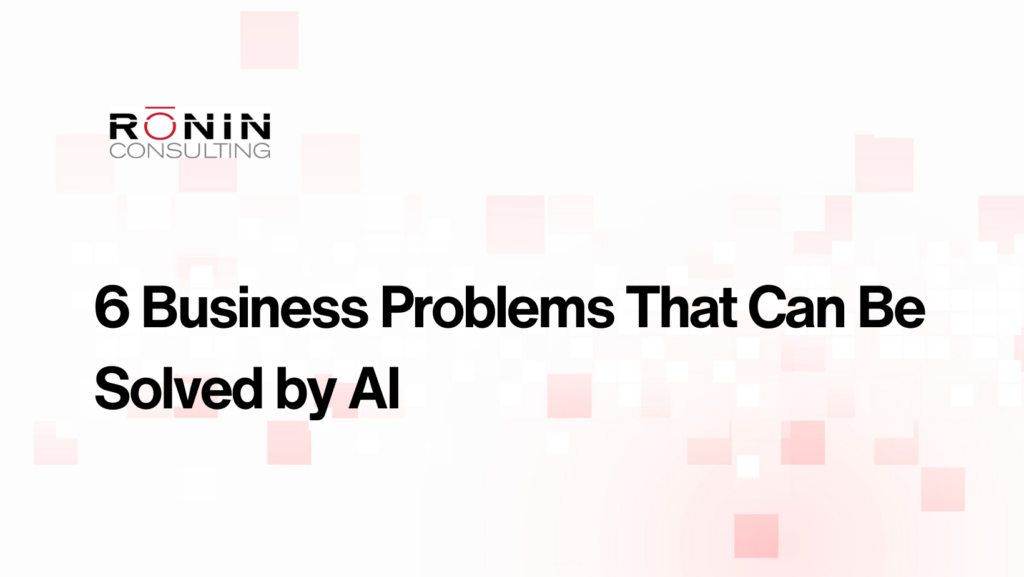
Artificial Intelligence (AI) has become a major transformative force in the business world. From its data analysis and decision-making capabilities to automation processes, AI is invaluable for companies seeking to overcome common challenges and enhance their operations. While not all businesses have dipped into the AI revolution, the ones that have are realizing how using AI offers innovative solutions that drive efficiency, productivity, and growth.
While AI systems are not infallible (yet), using AI for your business can solve many common business problems. The beauty of AI is that it is not just suitable for one particular vertical. Companies can tailor and finetune this technology to optimize and solve their problems. Some of the typical business problems that can be solved by AI include:
- Data Overload and Analysis Paralysis
- Inefficient Customer Support
- Supply Chain Management Breakdowns
- Human Resources and Talent Management Sourcing
- Fraud Detection
- Predictive Maintenance
While not exhaustive, this list covers problems, solutions, and real-life examples of how businesses facing these issues can use AI to solve them.
Data Overload and Analysis Paralysis
Problem: Businesses need help with a sea of data. Collecting, storing, and processing data is no longer the bottleneck; it’s the ability to extract meaningful insights from it. Businesses need data to help them make their business better. Still, with the average person generating a whopping 1.7 MB of data per second, the sheer amount of data has become overwhelming. When companies only analyze 37-40% of their data, and 70% of people say there is too much data to interpret and handle – it’s time to look for alternative solutions.
Solution: AI-powered data analytics and machine learning algorithms can quickly and accurately analyze large datasets. AI technology can also identify trends, patterns, and anomalies that humans might find impossible to discern. Data overload can be solved by AI software, which allows businesses to make data-driven decisions, improve customer targeting, and enhance product development.
Real-life example: A multinational e-commerce giant must analyze enormous customer data sets from online interactions and transactions. To address this problem, they can implement an AI solution. Using machine learning algorithms, AI can efficiently process data and provide valuable insights into consumer behavior, preferences, and purchasing patterns.
Artificial Intelligence Software Options:
Inefficient Customer Support
Problem: Providing prompt and efficient customer support can be challenging, especially for businesses with high call volumes and customer inquiries.
Solution: AI-driven chatbots and virtual assistants can handle routine customer queries. This AI solution allows human agents to focus on complex issues that AI cannot solve. AI chatbots can operate 24/7, ensuring that customers receive assistance anytime. According to recent statistics, 87% of consumers have a neutral or positive experience with AI chatbots, with only 12% of users reporting negative experiences. With over 88% of customers stating that they will not return to a website after a poor experience, ensuring customer interaction is as positive as possible is especially important for businesses.
Real-life example: A telecommunications company, overwhelmed with customer inquiries during peak service disruption periods, can integrate an AI-based chatbot system into its customer service platform. An AI chatbot system can efficiently handle routine queries and guide customers through troubleshooting processes and FAQs. Using this software, the company could see a decrease in customer wait times, a substantial increase in issue resolution rates, and an improvement in overall customer satisfaction scores.
Artificial Intelligence Software Options:
Supply Chain Management
Problem: Supply chain management was among the first business areas to advance technologically. This vertical consolidated data into expansive Enterprise Resource Planning (ERP), Inventory Management, or Demand Planning software platforms with accessible data sources. Yet, despite handling vast amounts of data, many of these original integrations lacked user-friendly analytical tools for delivering actionable insights.
Solution: Integrating AI software into supply chain management processes will enhance overall operations. Within these systems, AI can facilitate predictive demand analysis, real-time inventory monitoring, and automated reordering processes. AI algorithms can also assist in promptly identifying potential supply chain disruptions, offering alternative routes or suppliers in real time–curbing downtime, and reducing overall costs.
Real-life Example: A global logistics corporation encountered challenges predicting demand fluctuations and optimizing inventory levels across its extensive network. To solve this, they can implement the AI solution leveraging its machine learning algorithms to forecast demand accurately. AI will allow them to proactively manage inventory levels, minimizing overstock situations and reducing instances of stockouts.
Artificial Intelligence Software Options:
Human Resources and Talent Management
Problem: Finding talent, onboarding, and managing employee performance can be resource-intensive and costly. Hiring the wrong person can cost businesses upwards of $17,000 and become a source of internal strife and excess stress.
Solution: To facilitate the hiring process, AI can streamline recruitment by sifting through resumes, identifying the best candidates, and conducting preliminary interviews. AI can also analyze employee performance data to provide training and career development insights, enhancing retention rates. Using AI in this way will enable HR personnel to focus on engaging with qualified candidates and ensuring that the right folks are hired and thriving within their jobs.
Real-life example: A technology company must improve its recruitment process to streamline its hiring process. They can implement an AI platform that uses machine learning algorithms to screen job applications, identify top candidates, and conduct preliminary interviews by analyzing verbal and non-verbal cues. AI technology like this will allow the company to reduce the time-to-hire and increase the quality of recruited talent, positively impacting overall employee retention rates.
Artificial Intelligence Software Options:
Fraud Detection
Problem: The average eCommerce company uses over five fraud detection tools, and over 75% of businesses plan to increase their fraud detection budgets. Unfortunately, even with all this money spent on tools, companies are always vulnerable to fraud, which, if successful, results in significant financial losses and a damaged reputation.
Solution: Unlike traditional fraud detection software, artificial technology can be trained using a company’s historical data. AI can recognize patterns of fraudulent activities and help businesses detect and prevent fraud in real time. A learning AI tool can save companies considerable resources and protect their financial integrity.
Real-life example: A financial institution can use an AI-driven fraud detection system to find and prevent fraudulent activities. This machine-learning algorithm can analyze transactional data, detecting suspicious patterns and anomalies across various financial interactions. A proactive approach to fraud detection will help financial institutions prevent fraudulent transactions, safeguard their clients’ accounts, and minimize financial losses due to fraudulent activities.
Artificial Intelligence Software Options:
Healthcare Process Optimization
Problem: The healthcare industry needs help streamlining its processes. Siloed data, disparate systems, and manual administrative tasks contribute to bottlenecks in delivering quality patient care.
Solution: AI-driven healthcare optimization can revolutionize the industry by integrating data sources, automating administrative tasks, and facilitating data-driven decision-making. Machine learning can analyze patient data to predict potential health issues and optimize scheduling for appointments and surgeries. Using AI to optimize healthcare data and allocate resources will enhance patient care and improve efficiency.
Real-life example: A large healthcare company wants to create an innovative solution to simplify and enhance its complex Prior Authorization (PA) process. The existing process causes delays in patient care and adds to the workload of healthcare professionals. Using an open-source large language model (LLM) trained on clinical data to write individualized, high-quality PA letters, this company was able to accelerate the process of PA letter creation and decrease overhead.
Artificial Intelligence Software Options:
Choose Rōnin Consulting For Custom AI Solutions
As technology evolves, AI will continue to stand at the forefront of innovation. AI’s ability to dissect data, streamline processes, and foresee potential disruptions has made it an indispensable asset for companies worldwide. With Ronin Consulting AI software solutions and expertise, your businesses can use AI to transform their operations, drive efficiency, and chart a course toward sustainable growth in an ever-evolving business landscape.





